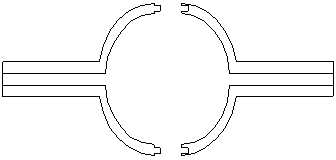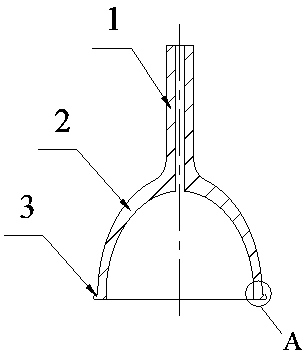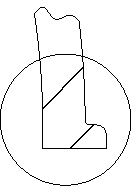Two-piece ceramic bulb shell and manufacturing method thereof
A manufacturing method and bubble shell technology, applied in electrical components, cold cathode manufacturing, electrode system manufacturing, etc., can solve the problems of affecting performance, deformation of the blank, difficult control, etc., to ensure coaxiality and ensure reliable bonding properties, and the effect of increasing the bonding area
- Summary
- Abstract
- Description
- Claims
- Application Information
AI Technical Summary
Problems solved by technology
Method used
Image
Examples
Embodiment 1
[0045] Embodiment 1, making a batch of 150W ellipsoidal two-piece ceramic blister
[0046] 1. According to the requirements, use spray granulated high-purity alumina to form a batch of blister blanks by isostatic pressing.
[0047]2. Configure a batch of slurry, the main component is high-purity alumina powder, add 3% glycerin, 4.5% terpineol, 2% dioctyl phthalate, 1% didecyl phthalate, 2% Epoxy resin, 0.3% polyamide wax, 0.25% hydrogenated castor oil, the viscosity of the test slurry is 32000mPa×S, and the prepared slurry is sealed and stored on a rotating table in a constant temperature box to rotate at a constant speed.
[0048] 3. Put the formed blank capillary down and the cavity joint ring up into the Figure 8 In the jig shown, a thin paste layer is printed on the surface of the bonding ring of the body cavity by using thin film printing technology, and the thickness of the paste layer is about 0.04mm.
[0049] 4. Take half of the green body with printed paste from ...
PUM
| Property | Measurement | Unit |
|---|---|---|
| viscosity | aaaaa | aaaaa |
| height | aaaaa | aaaaa |
| thickness | aaaaa | aaaaa |
Abstract
Description
Claims
Application Information
 Login to view more
Login to view more - R&D Engineer
- R&D Manager
- IP Professional
- Industry Leading Data Capabilities
- Powerful AI technology
- Patent DNA Extraction
Browse by: Latest US Patents, China's latest patents, Technical Efficacy Thesaurus, Application Domain, Technology Topic.
© 2024 PatSnap. All rights reserved.Legal|Privacy policy|Modern Slavery Act Transparency Statement|Sitemap



